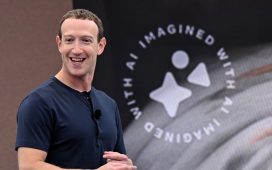With help from Leah Nylen and Cristiano Lima
Editor’s Note: Morning Tech is a free version of POLITICO Pro Technology’s morning newsletter, which is delivered to our subscribers each morning at 6 a.m. The POLITICO Pro platform combines the news you need with tools you can use to take action on the day’s biggest stories.Act on the news with POLITICO Pro.
— Escaping the Microsoft analogy: There are obvious parallels between the Justice Department’s 1998 case against Microsoft and its new suit against Google. As the search giant now goes on the defensive, it’s trying to prove that comparison doesn’t hold.
— What’s on tap for DOJ-Google if Biden wins the presidency?: A President Joe Biden would be able to continue the Google lawsuit, broaden it, or settle it — and he could mean even more trouble for the search giant.
— FTC called out: The agency’s former chairwoman, who voted in 2013 to close an antitrust probe into Google, says she doesn’t regret her vote — though Google critics think she should.
IT’S WEDNESDAY; WELCOME TO MORNING TECH! I’m your host, Alexandra Levine. “Think before you retweet” is the new rule-of-thumb on our minds today. When you retweet, you’ll now be prompted to add your own comment before doing so, a change that is part of Twitter’s fight against misinformation ahead of the election. Give it a try; not everyone’s a fan.
Got a news tip? Write to Alexandra at [email protected], or follow along @Ali_Lev and @alexandra.levine. An event for our calendar? Send details to [email protected]. Anything else? Full team info below. And don’t forget: Add @MorningTech and @PoliticoPro on Twitter.
HOW GOOGLE PLAYS DEFENSE: IT’S NOT THE ‘90S — The Justice Department’s long-awaited Google antitrust case is out. And as many antitrust experts noted, it looks a lot like the DOJ’s 1998 case against Microsoft where prosecutors alleged the Redmond, Wash. company illegally tied its browser Internet Explorer to its dominant operating system Windows in an effort to shut out rivals like Netscape. And DOJ isn’t trying to hide it; they cite Microsoft on page 5. Google’s line of defense: It’s not the 1990s anymore, and consumers can easily download whatever alternatives they want. (ICYMI: POLITICO’s antitrust reporter Leah Nylen has the skinny on who to watch in the Google case, and how we got here.)
— Defaults aren’t all that: Company reps said consumers use Google because they want to and it offers the best service. Their evidence? Europe. The bloc’s competition regulator fined Google more than $4 billion over the same Android contracts in DOJ’s suit (the company is appealing). To remedy the alleged harm, Google introduced a choice screen that lets Android users pick their search engine. About 97 percent of users still pick Google, according to the firm. The search giant also disputes that its data advantage is what makes it the better option; the technology and method underlying the search algorithm is what makes Google’s results the best, the company claims.
— Not so fast: Rival search engine DuckDuckGo said Google’s argument doesn’t hold water. “Google saying it’s not about the data is like an oil company saying it’s not about the oil,” DDG’s Kamyl Bazbaz told Leah. “It’s the foundation for their advertising business, which drives most of their revenue, which has given them the power to trap the market in place, block competitors and deploy behavioral targeting.” Google is right in one sense, though: “It is all about ‘the method.’ And that method is blocking other search engines from acquiring significant market share,” Bazbaz said.
— Opinion: Former FCC Chairman Tom Wheeler also weighed in on DOJ’s fight against the Silicon Valley giant. “It isn’t enough to stop the abuses of Big Tech,” he writes in TIME. “There is no single solution. What is needed is a cocktail of remedies that blends antitrust with ongoing regulatory oversight.”
— In any case, making Google change its ways will be no easy feat. Yes, the suit was met with resounding bipartisan praise, but here’s why breaking up (Google) will be so hard to do.
2020 WATCH: WHAT HAPPENS TO THE GOOGLE SUIT IF BIDEN WINS? — A President Joe Biden’s administration will have three possible options with the Google lawsuit: continue the suit as is; broaden it; or settle it. But a Biden White House might mean even more trouble for the search giant.
— The case launched Tuesday by the Justice Department has the sign-on of 11 Republican attorneys general, but Democrats broke off from the DOJ fight in hopes of pursuing a broader and more aggressive complaint. Those Democratic AGs are likely to give Biden his cues for how to handle Google. Between their separate fight and the progressive wing of the Democratic party increasingly calling for breakups of Big Tech, the heat will be on Biden to go after the core business models of large tech companies like Google. Keep an eye out today for Leah’s story on the implications of a Biden administration.
NO REGRETS: FTC FLASHBACK TO 2013 — In an interview with my colleague Steven Overly on Tuesday, former FTC Commissioner Edith Ramirez said she stands by her vote from 2013 to close the agency’s investigation into Google’s alleged search bias, though it was “absolutely” a close call. “We do the best that we can with the facts that we have at hand,” said Ramirez, now a partner at Hogan Lovells. “I don’t regret that vote.”
— But Gary Reback, who represented several companies in the FTC probe, called that explanation “bullshit.” “The fact is that everything that is in this complaint could have been charged before and to better effect,” said Reback, an antitrust lawyer with Carr & Ferrell. “You can see from this complaint the problems with Android are and were terrible problems. The FTC was apprised of those problems and chose to shut down the investigation.”
AND BACK TO THE SUBPOENA SAGA: MORE JUDICIARY REPUBLICANS PUSH FOR TECH CEOS TO TESTIFY — Two more Republicans on the Senate Judiciary Committee came out in favor of issuing the subpoenas to compel the testimony of the CEOs of Facebook and Twitter for an imminent hearing — amid some internal GOP disagreements about whether to move ahead on the action. Sens. Thom Tillis (R-N.C.) and Mike Lee (R-Utah) tweeted Tuesday that they support approving subpoenas, with Lee suggesting the vote will take place on Thursday.
— But the picture is far murkier: The committee said it will entertain the motion at a Thursday meeting — where lawmakers will also be voting on Supreme Court nominee Amy Coney Barrett — but that scheduling a vote will only occur if they fail to reach a deal for voluntary testimony with the companies. A panel spokesperson confirmed to MT that the motion could be held over. That would give the committee an extremely tight window to turn around a blockbuster hearing ahead of Election Day, a target Republican leaders have said they want to hit.
— Meanwhile, frustrations are mounting in some corners: Sen. Josh Hawley (R-Mo.), who has been vocal in urging for a subpoena vote, tweeted Tuesday, “Delay, delay, delay. Judiciary should VOTE. Those Republicans who are opposed to calling out #BigTech can go on record.” On the possible vote timing, Hawley remarked during a press call Tuesday, “We’ll see if it comes up on Thursday or not.”
FIRST IN MT: TECH INDUSTRY RAMPS UP RACIAL JUSTICE WORK — A leading Washington-based trade group that counts Amazon, Facebook, Google and Twitter as members is revving up its efforts to elevate and advance legislation addressing racial justice issues. The Internet Association this morning launched a Racial Justice State Legislative Tracker meant to help member companies, criminal justice reform advocates and civil rights organizations like the NAACP and Color of Change monitor and mobilize around related legislation across the U.S. (We got an early look and suggest you check it out.)
The new tool builds on the lobbying group’s commitments in June — in the wake of the killing of George Floyd and the global protests against racial injustice — to push Congress to reform accountability and transparency in policing; demilitarize law enforcement; and invest in alternatives to incarceration.
— What’s next: The trade group also announced today a pledge to improve diversity among the third-party vendors and suppliers working with its member firms — pushing them, for example, to invest more in companies owned by women and minorities. (Sound familiar? Though Apple is not a member, CEO Tim Cook committed in June to spending more with black-owned partners across the tech giant’s supply chain.) In addition to tracking supplier diversity, the Internet Association is hosting a virtual FCC event on the topic this Friday.
2020 TO 2025: ROBOTS WILL CREATE MORE JOBS THAN THEY’LL REPLACE — That’s the big takeaway from a new World Economic Forum study on automation in the workplace. The annual Future of Jobs report, released Tuesday evening, found that robots will replace 85 million jobs globally in the next five years while creating 97 million more — a trend accelerated by the pandemic that we heard about at POLITICO’s AI Summit last week. And on average, that shift is happening at a faster clip at companies in the U.S. than in many other parts of the world.
— Who’s in: Data scientists, engineers and machine learning specialists. Among those almost 100 million new jobs, the top emerging professions are expected to focus on artificial intelligence, cloud computing and content creation, according to the research, which also suggested that many of the people filling those roles will have pivoted from entirely different careers. Transitions into these new fields could take roughly one to five months, per the report, but the most competitive companies will look increasingly to reskill current employees rather than hiring new ones.
— Who’s out: Secretarial and administrative positions, and manual white- and blue-collar jobs. Just over 40 percent of companies surveyed said they plan to shrink their workforce because of tech integration, while a similar share said they plan to lean more on contractors for highly specialized tasks. Perhaps most striking is the report’s calculus that by 2025, employers will split work equally between humans and machines.
— And finally: Top brass from the nearly 300 global companies surveyed said they could move almost half of their employees (44 percent) to work remotely. Cue the Zoom fatigue.
Meghan Pearce, former legislative correspondent to Sen. Pat Toomey (R-Pa.), has joined TechNet as its new federal policy coordinator. … Tom Ryan, CEO of Pluto TV, was named president and CEO of ViacomCBS Streaming; Marc DeBevoise is stepping down as chief digital officer of ViacomCBS and and president and CEO of ViacomCBS Digital; Kelly Day, chief operating officer of ViacomCBS Networks International is becoming its president of streaming; and Pierluigi Gazzolo is stepping down as president of streaming and studios for international. … Driverless technology firm Motional is the newest member of The Self-Driving Coalition, which represents the autonomous vehicles industry and also includes Ford, Lyft, Uber, Volvo and Waymo. … The Wireless Internet Service Providers Association announced a partnership with U.S. tower company Tillman Infrastructure.
Lobbying latest, via POLITICO Influence: T-Mobile has added Patrick Williams of the Cormac Group to its long list of outside lobbyists, my colleague Theodoric Meyer reports. Williams will lobby on wireless spectrum issues “and COVID-19 proposals and actions related to broadband,” according to a disclosure filing. And Roku has hired the Glover Park Group to raise its profile in Washington. The company also retains Hogan Lovells, according to a disclosure filing.
Another swipe at Section 230: “A pair of House Democrats on Tuesday unveiled legislation to pare back the internet industry’s prized liability protections in instances where major platforms recommend or amplify user content that infringes on civil rights or is linked to foreign terrorism,” Cristiano reports.
Eyeballs watching emoji: White House economic adviser Larry Kudlow said that President Trump has been consulting with the Justice Department on the Google antitrust suit, without disclosing the extent of the president’s involvement, Reuters reports. (This could prove controversial given the president’s continued sparring with Silicon Valley.)
2020 watch: Silicon Valley megadonors including Facebook’s billionaire co-founder Dustin Moskovitz have quietly unleashed a last-minute, under-the-radar $100 million anti-Trump TV campaign, Vox Recode reports.
Workforce woes: Top business groups including the U.S. Chamber of Commerce filed a lawsuit in California federal court fighting the Trump administration’s recent rules that drastically restrict the H-1B visa program for foreign specialty workers, POLITICO reports.
Tips, comments, suggestions? Send them along via email to our team: Bob King ([email protected], @bkingdc), Heidi Vogt ([email protected], @HeidiVogt), Nancy Scola ([email protected], @nancyscola), Steven Overly ([email protected], @stevenoverly), John Hendel ([email protected], @JohnHendel), Cristiano Lima ([email protected], @viaCristiano), Alexandra S. Levine ([email protected], @Ali_Lev), and Leah Nylen ([email protected], @leah_nylen).
TTYL.









